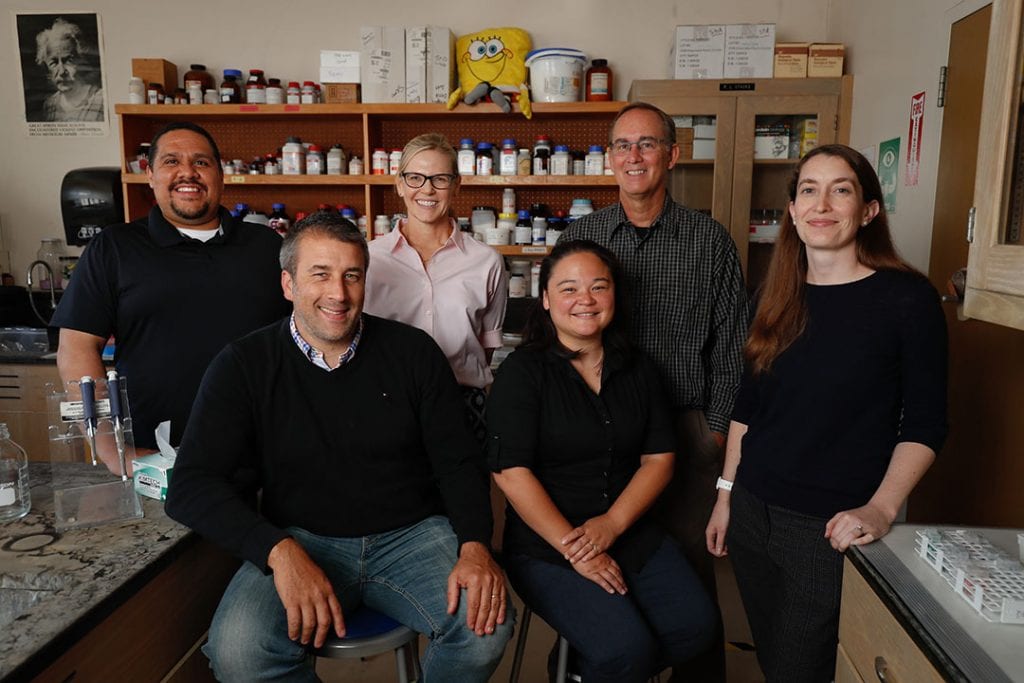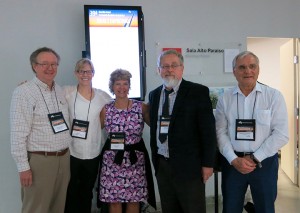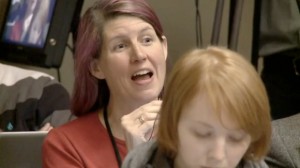
SJSU professors are using a grant from the W. M. Keck Foundation to create a freshmen research initiative. Clockwise from back left: Assistant Professor Alberto Rascón, Jr., Professor Resa Kelly, the program evaluator; Professor Daryl Eggers; Assistant Professor Laura Miller Conrad; Mallory Kato, the program manager; and Professor Lionel Cheruzel, the principal investigator on the grant. (Photo: Jim Gensheimer)
The new Freshman Initiative: Research to Engage Students (F.I.R.E.S) will launch this year and is poised to help the university advance both its research and student success missions. Enabled by a $325,000 grant from the W. M. Keck Foundation, this new program aims to engage undergraduate students in scientific research from the very beginning of their time at San Jose State University.
The team spearheading this program includes four chemistry professors from the College of Science with experimental research laboratories: Professor Lionel Cheruzel, the principal investigator on the grant, Assistant Professors Laura Miller Conrad and Alberto Rascón, Jr., Professor Daryl Eggers, Professor Resa Kelly, the program evaluator along with Mallory Kato, the program manager.
Cheruzel and his colleagues strive to usher in a research-driven educational culture by introducing first-year students to the benefits of research. In order to do so, an introduction to research course (Chem 190) will be used to foster student’s spirit of discovery and train them in the basic skills necessary to excel in a research environment.
At the end of the course, students will work directly with two professors’ laboratories in two-week research streams. During these streams, students will have the opportunity to look closely at the various research questions being investigated, perform cutting-edge research, and learn how to be part of the scientific community.
Cheruzel believes the experience will motivate these students to [continue] on in one of the various research laboratories throughout the remainder of their undergraduate career to supplement their degree.
“There are benefits to having students who can stay on for three or four years doing research,” Cheruzel said. “Some of my most productive students have come straight out of Chem 1A.”
Within each of the research laboratories, the professors have seen how engaging in lab work and publishing their findings in notable journals has benefitted their students. After applying their education to real-world problems, demonstrating a persistence to training and developing stronger connections with faculty, these research students not only leave SJSU with a bachelor’s degree but with a skillset that distinguishes them from their competition.
“They are highly marketable,” Cheruzel said, noting that many of his former students have gone on to prestigious graduate schools or started careers with prominent biotech companies.
Based in Los Angeles, the W. M. Keck Foundation was established in 1954 by the late W. M. Keck, founder of the Superior Oil Company. The Foundation’s grant making is focused primarily on pioneering efforts in the areas of medical research, science and engineering and undergraduate education. The Foundation also maintains a Southern California Grant Program that provides support for the Los Angeles community, with a special emphasis on children and youth. For more information, please visit www. wmkeck.org.


